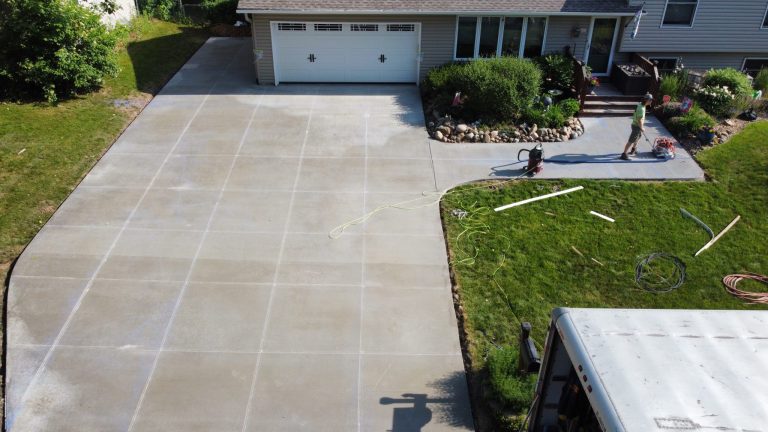Asphalt and concrete are two of the most common driveway materials. Both have distinct advantages and drawbacks, but the right material for your driveway largely depends on your budget, climate, and aesthetic preferences. This article will analyze the essential factors to help you decide which material suits your Lansing home.
Asphalt Driveway Installation: Key Considerations for Homeowners
Asphalt driveways are known for their quick installation process. They can be used within 24-48 hours of being laid, which is far quicker than concrete, which requires up to a week to cure fully.
However, while asphalt may have a lower upfront cost—ranging between $3 and $5 per square foot—it demands more frequent maintenance. Asphalt needs to be resealed every 3 to 5 years to prevent cracks, which may be an extra hassle for some homeowners.
In colder climates like Lansing, asphalt’s flexibility allows it to expand and contract with temperature fluctuations, reducing the risk of cracks.
Understanding the Lifespan of a Concrete Driveway
Concrete driveways are well known for their durability and long lifespan. While they cost more upfront, usually between $6 and $12 per square foot, they can last for 30 to 40 years with minimal maintenance. Concrete driveways don’t require the regular sealing that asphalt does, which makes them a popular choice for homeowners looking for a low-maintenance solution.
Concrete performs better in hot climates as it doesn’t soften under high temperatures like asphalt. However, in Lansing’s cold winters, concrete is more prone to cracking due to the freeze-thaw cycle. Proper installation with a stable gravel substrate is crucial to minimizing these cracks.
Cost Analysis: Asphalt vs. Concrete Driveways
Cost is often the deciding factor for many homeowners when choosing between asphalt and concrete driveways. Here’s a breakdown of the key costs:
Asphalt Driveways
On average, asphalt is cheaper upfront, with installation costs ranging from $3 to $5 per square foot. However, you’ll need to reseal it every few years, which adds to the long-term cost.
Concrete Driveways
While concrete costs more upfront—typically $6 to $12 per square foot—it requires less maintenance. The long-term costs tend to be lower since you won’t need to reseal it as frequently, making concrete a better option for those seeking longevity.
In Lansing, where winter weather can be harsh, the long-term investment in concrete might pay off despite the higher upfront costs.
Driveway Maintenance Costs: What You Need to Know
Maintenance is a critical factor when deciding between asphalt and concrete driveways. Asphalt driveways require resealing every 3 to 5 years, which costs around $0.10 to $0.20 per square foot for around $1.50 per square foot for professional sealing. Additionally, asphalt is more susceptible to potholes and cracks, requiring frequent repairs.
On the other hand, Converselyays require less frequent maintenance. Although you might seal the surface every 5 to 10 years to protect against stains, concrete generally requires less upkeep. One downside, however, is that concrete can stain more easily from oil spills, necessitating frequent cleaning.
Concrete Driveways in Cold Climates: Pros and Cons
Concrete driveways offer excellent durability, but they have a few drawbacks in cold climates like Lansing. Concrete is more susceptible to cracking during freeze-thaw cycles, when moisture enters small cracks, freezes, and expands, causing the cracks to grow.
To counteract this, you can opt for high-quality concrete with a low water-cement ratio, which minimizes the potential for cracks. Proper subgrade preparation and good drainage can also reduce the risk of freeze-thaw damage. However, concrete’s long lifespan and minimal maintenance often outweigh these concerns for many homeowners.
How Asphalt Flexibility Helps in Cold Weather
One key reason homeowners in Lansing choose asphalt is its flexibility. Asphalt can expand and contract with temperature fluctuations, making it more resistant to cracking in cold weather. This flexibility helps reduce the risk of damage caused by the freeze-thaw cycle, a significant concern for concrete driveways in colder climates.
However, despite its flexibility, asphalt may require more frequent repairs, particularly after harsh winters when ice and snow can damage the surface. Resealing asphalt every few years is essential to maintaining its appearance and integrity.
Customization Options for Your Driveway: Concrete vs. Asphalt
If aesthetics are important, concrete offers more customization options than asphalt. Concrete can be tinted, stamped, or textured to match the design of your home. You can choose from various colours, textures, and patterns to create a unique look.
On the other hand, asphalt is more limited in appearance. It’s typically black and doesn’t offer the same level of customization as concrete. However, some homeowners appreciate a black asphalt driveway’s clean, minimalist look.
The Environmental Impact of Asphalt and Concrete Driveways
Sustainability is a growing concern for many homeowners, and both asphalt and concrete have environmental considerations. Asphalt is often seen as more eco-friendly because it is recyclable. Old asphalt can be melted down and reused, making it a more sustainable option.
While durable, concrete has a larger environmental footprint due to its energy-intensive production process. However, innovations in green concrete have reduced its impact, making it a viable option for environmentally conscious homeowners.
Why Concrete Driveways Are Known for Their Durability
Concrete driveways are renowned for their longevity and durability. A well-installed concrete driveway can last 30 to 40 years, sometimes even longer, with proper care. It is resistant to heavy loads, making it ideal for homes with multiple vehicles or heavy traffic.
While concrete may crack in cold climates, these cracks are often superficial and don’t affect the overall integrity of the driveway. With proper installation and maintenance, concrete can offer excellent durability, even in challenging climates like Lansing.
Conclusion
Both asphalt and concrete driveways have pros and cons, and the choice between them depends on several factors, including budget, climate, maintenance needs, and aesthetics.
Asphalt is a more affordable option with flexibility for cold climates, while concrete offers superior longevity, durability, and customization options. You can choose the best material for your Lansing home by weighing these factors and considering your specific needs.

